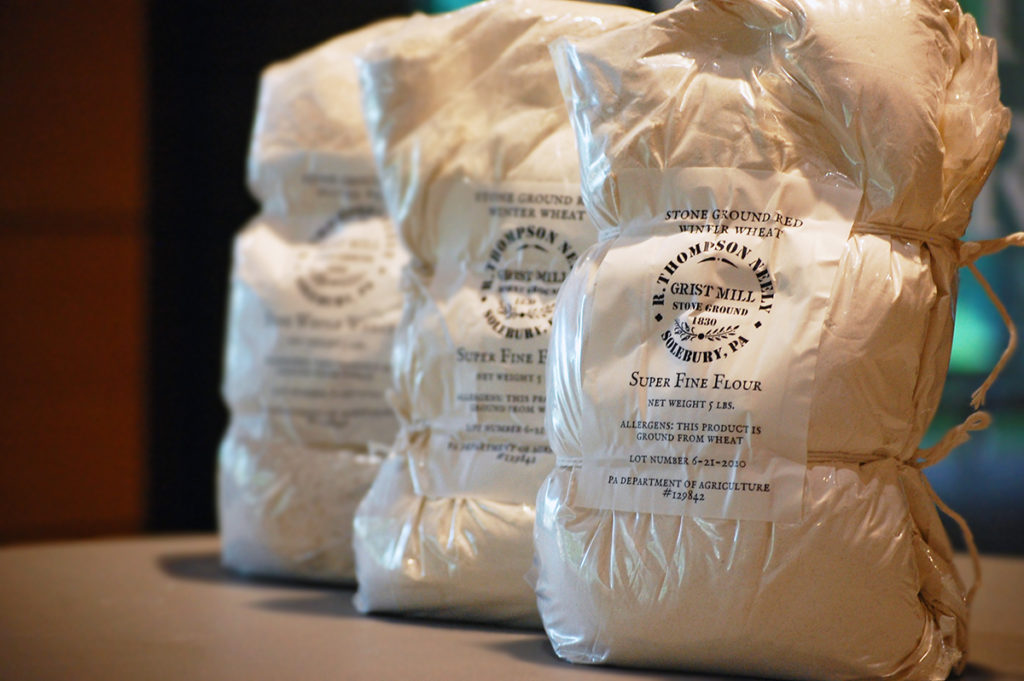
If you walked down the wiped-out baking aisle of your local grocery store at the height of the pandemic, you saw firsthand how many Americans have taken up baking.
For those looking to whip up some historically accurate treats, the Friends of Washington Crossing Park now sell flour ground in the park’s historic Thompson-Neely Grist Mill.
Period-accurate Flour
Five-pound bags of two kinds of flour – whole wheat and fine flour – are for sale in the Visitor Center gift shop for $12 a bag (shipping is not offered).
All the flour was ground in the mill using waterpower, 2,000-pound grinding stones, and period-accurate sifting equipment – just as it would have been more than a century ago.
“The flour we’re producing is finer and higher quality than anything you’ll find in the grocery store,” says head miller Glenn Blakely, who together with Ray Kasper and other volunteers spent the last four years restoring the formerly shuttered mill. “For example, we grind our whole wheat finer to remove the coarseness, but it still retains its nutrients. This makes it great for baking almost anything.”
The flour being produced at the Thompson-Neely mill is made with hard red winter wheat that is grown on a family owned farm in Lancaster. Hard winter wheat is usually grown in the Midwest and is common in the U.S., but it is hard to come by in small batches.
“We were excited when we found a Pennsylvania source,” Blakely says. “The flour we’re making is as close to farm-to-table as you can get. It’s Pennsylvania-made, every step of the way.”
The Thompson-Neely Grist Mill is licensed by the Pennsylvania Department of Agriculture to produce flour for public use.
One of the Most Authentic Mills in the Nation
Grinding wheat is new for the mill. Until recently, Blakely and two other millers, Dana Osterman and Sean Whitman, only ground corn because of equipment limitations. That changed when the volunteers completed their repairs.
“Being able to grind wheat is the result of four years of work,” says Blakely, who apprenticed twice at a historic Canadian mill to learn the craft. “The grinding stones had to be repaired, the sifting machine rescreened, the belts repaired, and all the wooden chutes put back together so everything could travel to the right places.”
Blakely, Osterman and Whitman have spent months perfecting the flour-grinding process.
“It’s like an art: the more you do, it the better you get,” Blakely explains. “We’re constantly perfecting the most economical ways to run the mill – how much water we’re using, how fast we’re turning the stones, how close the stones are to each other.”
Operating the mill requires 600 gallons of water per minute. The water flows into the mill and over the water wheel from a half-mile raceway that connects to Pidcock Creek. When operational, the millers can grind 400 pounds of flour per hour.
According to the Kentucky millwright who acted as a consultant during the repairs, the Thompson-Neely Grist Mill is one of only five American mills that is fully restored to 100% authenticity. Another is the mill at Mount Vernon.
“The pedigree of our mill is very high,” Blakely says proudly. “On a very amateur basis, we are up to par with a miller from 100 years ago. But that miller was doing it every day and had someone to teach him. We didn’t have that luxury.”

